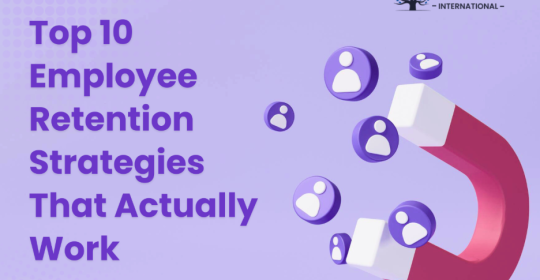And many companies usually underestimate the importance of onboarding while hiring new employees. Now, let us understand the framework of employee onboarding.
What is employee onboarding?
Onboarding employees is the process of thoroughly integrating a new employee within the business and its culture, by providing the new hires with the tools and information required to become productive members of the team. Formal training, accountability, and regular check-ins lead to successful employee onboarding. However, a comprehensive onboarding includes:
- Give new hires a run-through of the business: its people, tasks, business goals, values, etc.
- Introduction of new hires to their team and colleagues.
- Give them a tour of the office/workspace.
- Hand over any tools they need to execute their jobs such as laptops, ids, uniforms, and more.
- Sharing their OKRs and KPIs.
- Go through relevant on-job training.
Who does the onboarding of employees?
The onboarding is done by the recruiter, a member of the HR team, or a manager. All of them contribute to the onboarding process by introducing the new hires to the different outlook of the business. It is very usual for the new hire to be assigned a senior mentor during the onboarding process through onboarding software such as Easy Generator. It eases the learning process for new hires by offering them a sense of comfort in the new work environment. Recruiters pick a senior mentor who enhances a positive influence on the new employee.
Why is it important?
Onboarding is critical because it adjusts new hires to their role, business philosophies, and what the business has to offer. It also engages them, creating employees that are committed to the business's success and enables new hires to retain by making them feel like a team member. Here is a list of reasons why onboarding is important for a business:
Reduces employee turnover
Onboarding is important because once the new hire is accommodated and employed within the company, there is a higher probability of them sticking around. High turnover is hard on a company as well as expensive, thus retaining workers is vital. It also helps new hires in the business and engrosses them with company cultures.
Leads to positive outcomes
Employees who are engaged are most likely to be committed to their organization and their role. Businesses with more engaged employees have better development than businesses with less engaged employees. The positive outcomes linked to having engaged employees are:
- Lower turnover rates
- Higher profits
- Better safety records
- Better customer evaluations
- Higher product quality
- Fewer employment leaves
Reduce employee stress
Starting a new job and a whole new role can be full of stress and anxiety. An ideal onboarding process ensues in happier employees. It allows employees to get to know each other and learn how to communicate effectively. While onboarding new hires also helps discover how their roles fit in with the rest of the workforce, it also promotes the building of relationships, resulting in companionships which are a very important aspect of a happy work life.
Increased employee engagement
As we all know, employee engagement is essential to achieving overall organizational success. Thus, the emotional commitment of employees toward the business and its goals makes them care about their work and company. Employees not only work for a salary, or promotion but also work on behalf of the business’s goals. And, having engaged employees leads to greater business results.
Conclusion
Employees are the heart of the business. And businesses that want them to perform at their maximum potential must consider the onboarding experience as a golden opportunity to invest in their new hire. Therefore, using a tool that makes the onboarding process easier is crucial to maintain morale and happiness amongst your employees.






